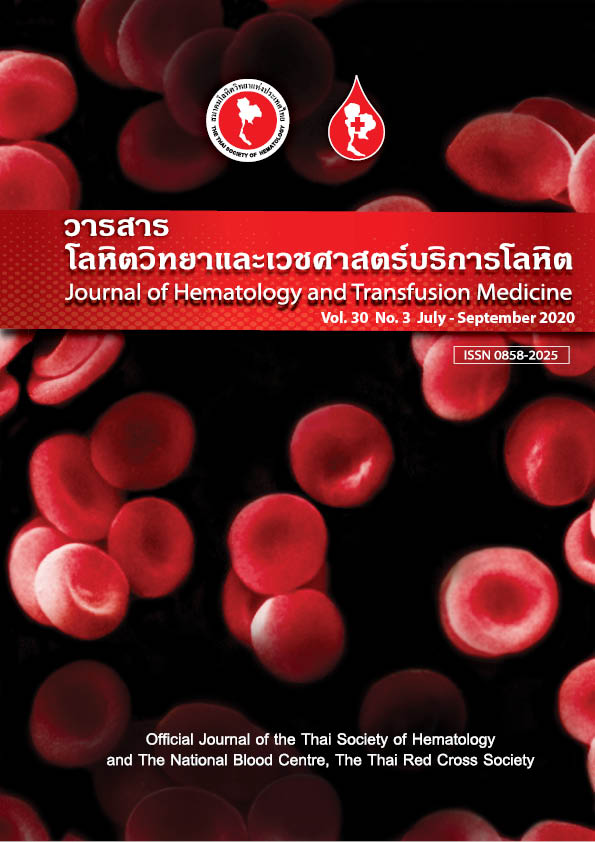Major histocompatibility complex class I-related chain A allele mismatching ในผู้ป่วยหลังปลูกถ่ายไตที่มีการปฏิเสธอวัยวะ
Keywords:
Graft rejection, Antibody mediated rejection, Kidney transplantAbstract
บทคัดย่อ
บทนำ การปลูกถ่ายอวัยวะจะพิจารณาความเข้ากันได้ของแอนติเจน HLA เพื่อป้องกันการเกิดการปฏิเสธอวัยวะ อย่างไรก็ตามยังมีระบบแอนติเจนชนิดอื่น เช่น แอนติเจนชนิด major histocompatibility complex (MHC) class I-related chain A (MICA) ที่นำไปสู่การเกิดการปฏิเสธอวัยวะได้เช่นกัน วัตถุประสงค์ เพื่อศึกษาความถี่การเกิดความไม่เข้ากันของแอนติเจน MICA ในผู้ป่วยปลูกถ่ายไตที่มีภาวะปฏิเสธไตจากแอนติบอดี วัสดุและวิธีการ ตรวจหาอัลลีลของ MICA ในผู้ป่วยปลูกถ่ายไตที่มีภาวะปฏิเสธไตจากแอนติบอดีและคู่ผู้บริจาคจำนวน 93 คู่ ด้วยเทคนิค polymerase chain reaction with sequence specific primers (PCR-SSP) ผลการศึกษา ตัวอย่างทั้งหมดจำนวน 93 คู่ พบ 68 คู่ (ร้อยละ 73) ที่มีผลแอนติเจน MICA ไม่ตรงกันระหว่างผู้ป่วยกับผู้บริจาค (MICA mismatched) โดยพบความถี่ของ MICA mismatched สูงที่สุดคือ MICA*008/027 (ร้อยละ 26.47) และผลการศึกษาความถี่ของอัลลีล MICA ทั้งในกลุ่มผู้ป่วยและผู้บริจาคไม่มีความแตกต่างกันอย่างมีนัยสำคัญทางสถิติ (P > 0.05) โดยอัลลีลที่พบสูงสุดคือ MICA*008/027, 010, 002/020 สรุป การศึกษานี้เป็นการศึกษาแรกที่รายงานความถี่การเกิด MICA mismatched ในผู้ป่วยปลูกถ่ายไตชาวไทยที่มีภาวะปฏิเสธไตจากแอนติบอดีและคู่ผู้บริจาค โดยพบความถี่ของการเกิด MICA mismatched ในผู้ป่วยได้สูง ซึ่งควรให้ความสำคัญเพราะอาจจะนำไปสู่ภาวะปฏิเสธอวัยวะจากแอนติบอดีในอนาคต
Abstract:
Introduction: In organ transplantation, the human leukocyte antigen system is considered to be essential for matching to prevent graft rejection. However, other antigens such as the major histocompatibility complex (MHC) class I-related chain A (MICA) antigens can also lead to graft rejection. Objective: This study aimed to investigate the frequency of MICA mismatched in kidney transplant patients with antibody mediated rejection (KT-AMR). Materials and methods: MICA alleles typing of 93 pairs of recipients with AMR and the corresponding donors were performed by polymerase chain reaction with sequence-specific primer (PCR-SSP). Results: Of the 93 pairs, 68 (73%) pairs were MICA mismatched and the most allele frequency of MICA mismatched was MICA*008/027 (26.47%). There was no statistically significant of MICA allele frequency between patient and donor (p-value > 0.05). The most common of MICA alleles in our study was MICA*008/027, 010, 002/020. Conclusion: This is the first study that reported the frequencies of MICA mismatched among Thais KT-AMR. Our data provide evidence that MICA mismatched in KT-AMR is high and should be remarkable that may lead to AMR in the future.
Downloads
References
2. Ferrari-Lacraz S. Analysis and monitoring of anti-HLA antibodies in solid-organ and stem cell transplantation: What to do? When should they be tested?. Geneva: Geneva University; 2015.
3. National Blood Centre, Thai Red Cross Society. Standards for blood banks and transfusion service. 4thed. Bangkok: Udomusksa; 2015.
4. Terasaki PI. Deduction of the fraction of immunologic and non-immunologic failure in cadaver donor transplants,” in Clinical transplants. Clin Transpl. 2003:449–552
5. Lee PC, Terasaki PI, Takemoto SK, Lee PH, Hung CJ, Chen YL, et al. All chronic rejection failures of kidney transplants were preceded by the development of HLA antibodies. Transplantation. 2002;74(8):1192-4.
6. hla.alleles.org [Internet]. London: Anthony Nolan Research Institute; 2015 [cited 2019 Jan 2]. http://hla.alleles.org/alleles/text_index.html.
7. Romphruk AV, Naruse TK, Romphruk A, Kawata H, Puapairoj C, Kulski J k, et al. Diversity of MICA (PERB11.1) and HLA haplotypes in Northeastern Thais. Tissue Antigens. 2001;58(2):83–9.
8. Baranwal AK, Mehra NK. Major Histocompatibility Complex Class I Chain-Related A (MICA) Molecules: Relevance in Solid Organ Transplantation. Front Immunol. 2017;28(8):182-94.
9. Valenzuela NM, Reed EF. Antibodies in Transplantation: The Effects of HLA and Non-HLA Antibody Binding and Mechanisms of Injury. Methods Mol Biol. 2013;1034:41-70
10. Antje I, Daniela S, Sebastian M, Pranali S, Leslie E, Lutz W, et al. The MICA-129Met/Val dimorphism affects plasma membrane expression and shedding of the NKG2D ligand MICA. Immunogenetics. 2016;68:109–23.
11. Zou Y, Stastny P, Süsal C, Döhler B, Opelz G. Antibodies against MICA Antigens and Kidney-Transplant Rejection. N Engl J Med. 2007;357(13):1293–300.
12. Pierre T, Nathalie G, Mathias C, Caroline P, Stéphanie A, Sylvie C, et al. MICA Variant Promotes Allosensitization after Kidney Transplantation. J Am Soc Nephrol. 2013;24(6):954–966.
13. Haas M, Loupy A, Lefaucheur C, Roufosse C, Glotz D, Seron D, et al. The Banff 2017 Kidney Meeting Report: Revised diagnostic criteria for chronic active T cell-mediated rejection, antibody-mediated rejection, and prospects for integrative endpoints for next-generation clinical trials. Am J Transplant. 2018;18(2):293–307.
14.Stephens H a. F, Vaughan RW, Collins R, Kondeatis E, Theron J, Payne A. Towards a molecular phototyping system for allelic variants of MICA, encoded by polymorphisms in exons 2, 3 and 4 of MHC class I chain-related genes. Tissue Antigens. 1999;53(2):167–74.
15. Romphruk AV, Romphruk A, Choonhakarn C, Puapairoj C, Inoko H, Leelayuwat C. Major histocompatibility complex class I chain-related gene A in Thai psoriasis patients: MICA association as a part of human leukocyte antigen-B-Cw haplotypes. Tissue Antigens. 2004;63(6):547–54.
16. Collins RWM, Stephens HAF, Clare MA, Vaughan RW. High resolution molecular phototyping of MICA and MICB alleles using sequence specific primers. Hum Immunol. 2002;63(9):783–94.
17. Lee PC, Terasaki PI, Takemoto SK, Lee PH, Hung CJ, Chen YL, et al. All chronic rejection failures of kidney transplants were preceded by the development of HLA antibodies. Transplantation. 2002;74(8):1192-4.
18.Worthington JE, Martin S, Dyer PA, Jahson RWG. An association between posttransplant antibody production and renal transplant rejection. Transplant Proc. 2001;33:475-6.
19. Cox ST, Stephens HA, Fernando R, Karasu A, Harber M, Howie AJ, et al. Major histocompatibility complex class I-related chain A allele mismatching, antibodies, and rejection in renal transplantation. Hum Immunol. 2011;72:827–34
20. Bahram S, Bresnahan M, Geraghty DE, Spies T. “A second lineage of mammalian major histocompatibility complex class I genes,” Proceedings of the National Academy of Sciences of the United States of America. Proc Natl Acad Sci U S A. 1994;91(14):6259–63.
21. Oliveira LA, Ribas F, Bicalho MG, Tsuneto LT, Petzl-Erler ML. High frequencies of alleles MICA*020 and MICA*027 in Amerindians and evidence of positive selection on exon 3. Genes Immun. 2008;9(8):697-705.
22. Gautier AC, Devys A, Cheneau ML, Simon PH, Martin C, Allard S, et al. MICA compatibility and immunization in third kidney transplantations. Transplant Proc. 2009;41:663–5.
23. Zwirner NW, Marcos CY, Mirbaha F, Zou Y, Stastny P. Identification of MICA as a new polymorphic alloantigen recognized by antibodies in sera of organ transplant recipients. Hum Immunol. 2000;61(9):97–24.



